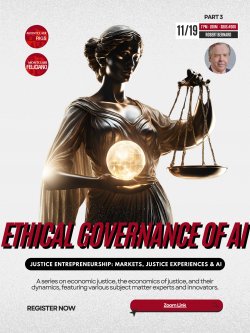November 19, 2024 7:00pm | Ethical Governance of Artificial Intelligence
Posted in: Events

This event explores the concept of Responsible AI (RAI) with a focus on mitigating biases in AI systems. Emphasizing the critical role of fairness, speaker Rob Bernard identifies RAI as essential for trustworthy AI adoption across sectors, especially where algorithmic decisions impact marginalized communities. Key elements include understanding fairness definitions, bias detection, and implementing interventions to address biases in model development. He argues for a structured approach to RAI, involving multi-stakeholder collaboration and robust model governance, underscoring transparency, security, and regulatory compliance as foundational practices for ethical AI integration.
About the series
“Justice Entrepreneurship: Markets, Justice Experiences and AI” aims at interdisciplinary collaboration among faculty and students, focusing on the intersections of justice, entrepreneurship, and artificial intelligence. The series includes several presentations and discussions, from September 2024 through April 2025. Each session will feature expert speakers on topics such as AI’s impact on entrepreneurship, governance, and community services. The expected outcomes include enhanced interdisciplinary scholarship and a reimagining of justice experiences through the lens of AI and entrepreneurship.
To register for the event click here.
The event will be in hybrid format, streamed via a zoom webinar and concomitantly taking place at the Feliciano Business School, room 101.
Speaker Bio

Rob Bernard is a Director of Climate Risk Modeling at PwC where he focuses on physical risk modeling, climate change, and related risk management and risk mitigation strategies. Rob leads a team that develops analytics, models, and quantitative frameworks that estimate the deleterious effects of climate change.
Rob has developed analytics and models in a variety of industries, from simulating long-term land use and demographic change for small towns, to creation of machine learning models of fraud detection, to creation of innovative natural language processing techniques for measuring engagement, commitment, and understanding in online discussion forums.
Rob has a Master’s degree in Urban and Regional Planning with a specialization in Gaming/Simulation Studies from the University of Michigan, a Bachelor’s degree in Psychology and Cognitive Science from Princeton University, and has recently completed his Master’s thesis in Predictive Analytics from Northwestern University. He has worked in data science and simulation for ten years at PwC, developed counterterrorism analytics for the US Intelligence industry for Boeing, and specialized in regional demographic and economic forecasting for the Southeast Michigan Council of Governments.
Moderator
David Axelrod is a researcher at Project AROS Lab at Montclair State University. He has taught for eight years, and developed the course Economics of Time and Mind, as well as co-developed Religion and Economics with Prof. John Soboslai. He also recorded a series of podcasts for the Feliciano School of Business. Previously he worked in the financial sector for twenty years. David received his PhD. in Economics from Rutgers University. He also plays electric bass and produced over a dozen albums of original music. David’s research has its foundations in issues around time preference, experiences as economic products/resources, and the mind (individual and social) as a scarce resource than can be developed and grown.
Organizer Bio
Ethné Swartz, Ph.D., is a Professor of Information Management and Entrepreneurship and a 2018-2019 Fulbright Scholar. She previously served at Fairleigh Dickinson University, where she chaired the Marketing and Entrepreneurship Department and was associate dean at the Silberman College of Business. She holds a PhD in Management from the University of Manchester and an MS in Information Systems from Manchester Metropolitan University. Her research focuses on entrepreneurship, innovation, business continuity, and crisis management. Dr. Swartz has conducted research on women’s entrepreneurship in sub-Saharan Africa and co-authored two books. She has published widely in journals including the International Journal of Gender and Entrepreneurship and Business Horizons. Dr. Swartz is a dedicated member of the United States Association of Small Business and Entrepreneurship (USASBE), serving as a board member and on the editorial board of the Annals of Entrepreneurship Education and Pedagogy. She is also active in supporting New Jersey’s entrepreneurial ecosystem.


